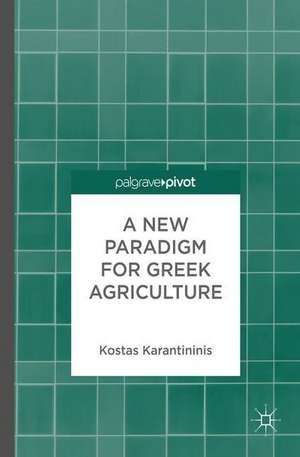A New Paradigm for Greek Agriculture
Autor Kostas Karantininisen Limba Engleză Hardback – 16 aug 2017
This book offers an assessment of new opportunities available for the agricultural sector and provides technical assistance to the Greek authorities with regards to its rural development and fishery sector. Karantininis follows a value chain approach and analyzes the Greek agri-food industry, breaking it down vertically and horizontally. Vertically, the Greek agri-food chain is stripped to its main upstream and downstream components: inputs, primary production, distribution and retail. Horizontally, the agri-food value chain is analyzed in terms of size, ownership, governance and space. The author pays special attention to policy formation, policy implementation, the political and industrial structure, land and credit markets, education, extension and research. The author focuses on this through three subcategories of fruits and vegetables, aquaculture and olive oil. A number of opinions and recommendations are presented in each section, concluding with propositions for a new institutional structure for Greek agriculture.
Preț: 419.21 lei
Nou
Puncte Express: 629
Preț estimativ în valută:
80.21€ • 83.76$ • 66.24£
80.21€ • 83.76$ • 66.24£
Carte tipărită la comandă
Livrare economică 15-29 aprilie
Preluare comenzi: 021 569.72.76
Specificații
ISBN-13: 9783319590745
ISBN-10: 331959074X
Pagini: 112
Ilustrații: XIX, 112 p. 42 illus., 39 illus. in color.
Dimensiuni: 148 x 210 mm
Greutate: 0.37 kg
Ediția:1st ed. 2017
Editura: Springer International Publishing
Colecția Palgrave Macmillan
Locul publicării:Cham, Switzerland
ISBN-10: 331959074X
Pagini: 112
Ilustrații: XIX, 112 p. 42 illus., 39 illus. in color.
Dimensiuni: 148 x 210 mm
Greutate: 0.37 kg
Ediția:1st ed. 2017
Editura: Springer International Publishing
Colecția Palgrave Macmillan
Locul publicării:Cham, Switzerland
Cuprins
Chapter 1. Introduction.- Chapter 2. Overview of Greek Agriculture.- Chapter 3. Policy Governance.- Chapter 4. Markets.- Chapter 5. Fruits and Vegetables, Aquaculture, Olive Oil, Organics, PDO and PGI.- Chapter 6. Framing a New Paradigm for Greek Agriculture.
Recenzii
Notă biografică
Konstantinos Karantininis is Professor of Business Administration at the Swedish University of Agricultural Sciences, Sweden. His research interests include the economics of agribusiness and value chains in western and developing countries, applied microeconomics, industrial organization, cooperatives, policy and new institutional economics.
Textul de pe ultima copertă
This book offers an assessment of new opportunities available for the agricultural sector and provides technical assistance to the Greek authorities with regards to its rural development and fishery sector. Karantininis follows a value chain approach and analyzes the Greek agri-food industry, breaking it down vertically and horizontally. Vertically, the Greek agri-food chain is stripped to its main upstream and downstream components: inputs, primary production, distribution and retail. Horizontally, the agri-food value chain is analyzed in terms of size, ownership, governance and space. The author pays special attention to policy formation, policy implementation, the political and industrial structure, land and credit markets, education, extension and research. The author focuses on this through three subcategories of fruits and vegetables, aquaculture and olive oil. A number of opinions and recommendations are presented in each section, concluding with propositions for a new institutional structure for Greek agriculture.
Caracteristici
Takes a fresh approach on the issue of agricultural reform: organization and governance of the Greek agri-food value chain Provides a detailed overview of the Greek agri-food value chain with emphasis on structures and organization Develops a paradigm of the organization of the agri-food value chain, including distinct roles for the government and the private sector Creates a strategy that involves stakeholders of the agri-food value chain, along with policy makers, and other sectors, such as tourism, biotechnology, research institutions Analyzes key agri-food industries in detail, such as olive oil, aquaculture, fruits and vegetables Includes supplementary material: sn.pub/extras
